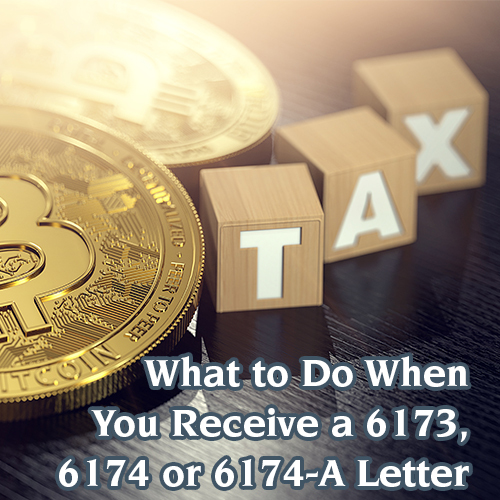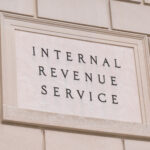
The IRS is focusing more resources on identifying cryptocurrency users who are not declaring their activities properly. In 2020 alone, the IRS sent over 10,000 warning letters to cryptocurrency users regarding the filing of their cryptocurrency taxes.
Currently, there are three different letters a cryptocurrency user may get from the IRS if the IRS has information that leads them to believe you have or had one or more accounts containing virtual currency but may not have properly reported your transaction.
What is a 6173 letter?
It is important that you do not ignore a letter 6173 from the IRS, if you receive one. This letter requires your action.
If you receive a letter 6173, the IRS believes you did not meet your U.S. tax filing and reporting requirements for your virtual currency transactions. Depending on your situation, you need to take at least one of the following actions:
- If you failed to file one or more income tax returns, file the delinquent returns and report your virtual currency transactions as soon as possible.
- If you made a mistake on your income tax return, such as not reporting your virtual currency transactions or incorrectly calculating your income, gain, or loss; you can file an amended return.
If you believe you appropriately followed all tax and information reporting requirements and you’re receiving the letter 6173 in error, you’ll need to follow a number of steps to prove this to the IRS.
At the top of the letter 6173, there’s an address and eFax number that you will want to send the following documentation to:
- A statement of facts explaining your position. Include a complete history of previously reported income from your virtual currency transactions. Explain the actions you took to become compliant with U.S. reporting requirements and provide copies of previously filed documents that confirm your compliance.
- Your contact information
- Your signed and dated letter 6173 section that states you, under penalties of perjury, are sending the IRS documents proving you are compliant with U.S. reporting requirements.
What if I Don’t Respond to a 6173 Letter?
If the IRS does not hear from you by the “respond date” on your letter 6173, they may refer your tax account for examination. Any under or non-payments of taxes you owe the IRS are subject to interest in penalties. The longer you wait to respond to a letter 6173, the longer and more expensive the process to get your tax account in good standing with the IRS will be.
What is a 6174 or 6174-A letter?
Like the letter 6173, the IRS sends letters 6174 and 6174-A when they believe you have or have had one or more accounts containing virtual currency. Difference in these, letters, though, is the IRS believes that you may not know the requirements for reporting transaction and the IRS is asking you to check your form 1040 filing to amend it, it necessary. The letter outlines the appropriate ways to report your virtual currency transactions. If you think you didn’t accurately report your virtual currency transaction on your federal tax return, you should file an amended or delinquent return.
You do not need to respond to a letter 6174 or 6174-A, however, if your receive a 6174-A, the IRS warns they may send other correspondence that you will need to respond to in the future.
We’re Here to Help
You don’t have to navigate reporting your cryptocurrency transactions alone. Along with online tools from major exchanges, the tax professionals at Corrigan Krause are up-to-date on all necessary reporting for your virtual currency need. Email info@corrigankrause.com for more information and watch a replay of our July 13th webinar Cryptocurrency 101: What your Accountant and Advisor Want You to Know.

